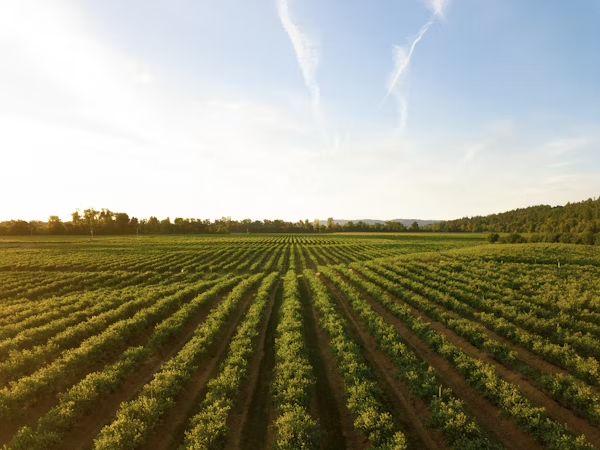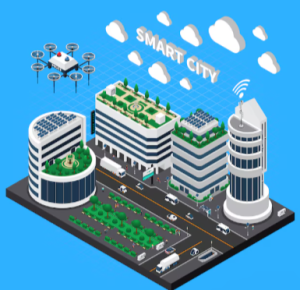Biotechnology becomes a point of resolution to transform agriculture in America. It helps farmers face problems in food insecurity, climate changes, and resource depletion through the conjoining of biology with technology. This article addresses how biotechnology can bring an agricultural revolution in America, its key applications, and what it will do to the practice of farming.
What is Biotechnology in Agriculture?

- Biotechnology in agriculture may be defined as the modification or manipulation of plants, animals, or microorganisms using biological or scientific methodologies towards a higher productivity-promoting green technology with increased sustainability and resilience. It involves genetic engineering, marker-assisted breeding, and many advanced breeding technologies.
- In America, with biotechnology, agriculture was lain with concepts to improve farm productivity, limit chemical inputs, and be adaptable to environmental fluctuations.
- The role of Biotechnology in Changing the American Face of Agriculture.
The agricultural sector of the US has many impediments, example, limited area of arable land; erratic weather patterns create difficulty in planning, and food demand is on the increase. Changes in innovations due to biotechnology will create a panorama in solving and probably negating such questions about sustainable food production.
Genetically Modified (GM) Crops
- One of the first applications of biotechnology was in producing crops that were genetically modified. The seed is developed to exhibit characteristics such as pest resistance, drought tolerance, and higher nutritional content- features which were programmed into it.
- For instance, corn and soybeans are two of the best-known GM crops planted widely in the USA. The reason is that these crops have suitable and resistant traits to pests and herbicides that reduce chemical applications.
- Hence, farmers greatly profit through increased yields and production expenses while the end users enjoy cheap and abundant food.
Drought-Proof Varieties
- Rapidly changing climatic issues have made most areas susceptible to droughts.
- To prevent crop failure, American scientists have handled the problem of semi-drought-resilient crops through biotechnology so that even in the dry season, little water is required for their production.
- For instance, these drought-tolerant maize seeds are helping farmers in arid areas to conserve water without affecting yields.
Crop Disease and Pest Control through Biotechnology
- Pest and disease infestation are the two most important causes of crop yield loss during the crop season and inflict losses worth millions to farmers every year. Crop biotechnology offers alternative methods of managing such threats through genetically modified crops that resist specific pests and diseases.
- These Bt crops such as Bt cotton are genetically modified crops, which contain specific genes from a soil bacterium that makes them insecticides. Thus, these crops save on chemical pesticides reducing costs in farming and making it more environmentally sustainable.
Improved Soil Health
- It plays an indispensable role in augmenting soil health. Bioengineered crops could be such plants, facilitating nitrogen fixation in soil and minimizing synthetic fertilizer usage.
- It introduces to soil beneficial microbes of microbial biotechnology that potentially help plant growth and enhance the fertility status of the soil.
Precision Agriculture and Data-driven Insights
- Precision agriculture is not entirely biotechnology, but in most cases, they go together.
- Data from the genomics empower farmers on making the right decisions such as which crop varieties to plant, when to harvest, and how to manage resources efficiently.
- In the US, CRISPR (a gene-editing technology) is applied to the advantages of good traits into crops. It offers modifications that are precise; therefore, the higher success in practices on raised agriculture.
Biotechnology Major Benefits in Agriculture
Indeed, biotechnology has advantages to all stakeholders in the agricultural endeavor-from farmers, consumers, and the ecosystem in general. Some of their advantages are:
Increased Crop Yields
- These changes have been helpful for farmers in increasing productivity without increasing the size of their land.
- And this would be quite beneficial for populations whose demands are expected to increase.
- Reduced Environmental Impact
- Biotechnology reduces pollution by chemical pesticides and fertilizers.
- Moreover, GM crops need relatively less water and energy to farm them. Thus, it makes agriculture more sustainable.
Enhanced Nutritional Quality
- Crops are considerably improved due to the technology.
- Biofortified crops like Golden Rice were developed to contains a lot of vitamin A to decrease the deficiency in certain vulnerable populations.
Economic Benefits
- Farmers are also benefited economically due to reduction of inputs as well as increased production.
- Biotechnology would further promote rural economies through generation of employment at the post-processing level for crops.
Problems of Agriculture Biotechnology
With all benefits, there are many problems ports biotechnology in agriculture:
Public Perception and Misinformation
- Many consumers tend to be suspicious regarding genetically modified organisms (GMOs) due to the misinformation.
- Educating the public about the issues of safety and benefit for biotechnology would help to encompass the entire community toward a positive acceptance.
Regulatory Barriers
- In the USA, the regulatory process for biotech product approval is lengthy and costly.
- It may ensure safety, but it would also put barriers to the access of the new and enhanced solutions.
Ethical Concerns
- There are those who raise ethical questions on the engineering genetically to modify an organism.
- There should be broad and open discussions at the time of development to address such concerns.
Geographic Disparities
- Biotechnology solutions may not exactly be affordable for small holder farmers and hence they contribute to inequitably sharing the advances made in farming.
- One way that can be employed to combat these disparities is to ensure that governments and relevant organizations put in place policies that can be used by the majority to access equity with regard to these technologies.
Contribution of the USA to the Advancement of Agricultural Biotechnology
- The United States is an undisputed world leader in agricultural biotechnology. Its universities, research institutions, and biotech companies have a pioneering role in innovation related to agricultural biotechnology.
- Some of the most well known are the USDA (United States Department of Agriculture), which approves biotech products for safety and efficacy using data generated by many independent institutions, or the FDA (Food and Drug Administration), among others, which also is responsible for developing and regulating those products.
- American companies like Monsanto (now part of Bayer), DuPont, and Syngenta have developed groundbreaking solutions that are used worldwide. The US also collaborates with other countries to share knowledge and promote sustainable farming practices.
Examples of Biotechnological Success Stories
Several biotechnological advancements in the USA have had a significant impact on agriculture:
- Roundup Ready Crops: These GM crops are resistant to glyphosate herbicide, making weed control easier for farmers.
- Drought-Tolerant Maize: Developed using gene-editing techniques, this maize ensures stable yields under water-scarce conditions.
- CRISPR-Edited Tomatoes: Researchers have used CRISPR to create tomatoes with longer shelf lives and better nutritional content.
The Future of Biotechnology in Agriculture
The future of agricultural biotechnology in the USA looks promising. Emerging technologies like synthetic biology, AI-driven gene editing, and microbial engineering are set to revolutionize farming further. Scientists are also working on climate-resilient crops that can thrive in extreme weather conditions.
Additionally, advancements in vertical farming and urban agriculture will complement biotechnological innovations, ensuring food security for urban populations.
Biotechnology in particular is considered to be the most crucial thing for shaping the last revolution in agriculture in the USA. Conversion of agriculture into more sustainable and effective practice is achieved by tackling issues like climate change, pest control, and food security.
Even though there’re so many things that need to be taken care of, the pros of biotechnology still overweight the cons. Given that the USA remains the leader in the agricultural innovations, biotechnological advancements will not only benefit American farmers but also set an example for the globe regarding sustainable farming.
In a nutshell: biotech is going to bring a more secure and prosperous future in agriculture for farmers, for consumers, and indeed, for the planet itself.



